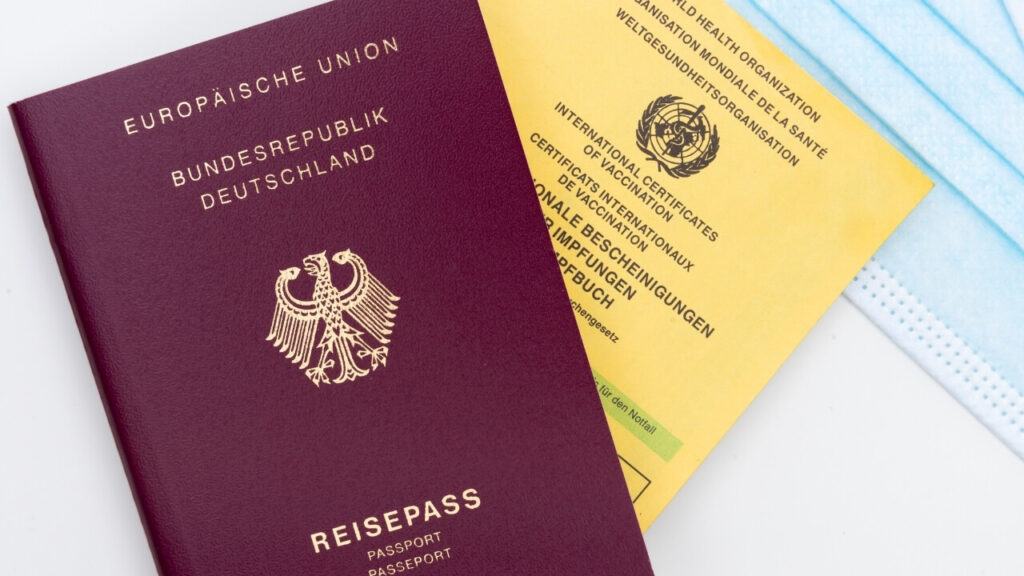German parliament or the Bundestag decided to change the nationality law. In a roll-call vote, most MPs agreed with the change. Now, it should be simpler to obtain German Citizenship in 3 Years. However, there are also stricter rules in place at the same time.
On this Friday (19.01.2024), the Bundestag agreed to alter the nationality law. People from other countries living in Germany can now become citizens more quickly– in five years instead of the former eight.
If they can show special integration achievements, like language skills, the process now takes three years instead of the previous six.
Getting German citizenship should be easier
The reform aims to make naturalization easier and allow dual citizenship. However, there are also stricter measures. The government wants to make it tougher for people to become citizens.

This will happen if they can’t support themselves or don’t support Germany’s free and democratic system.
In a roll-call vote, most MPs supported the reform. Out of the 639 votes, 382 were in favor, 234 were against, and 23 abstained.
In the second reading, the SPD, Greens, and FDP groups, called the traffic light factions, said “yes” to the changes. On the other hand, the CDU/CSU and AfD said ‘no.’. Non-affiliated MPs, many from the Left or the Sahra Wagenknecht Alliance, chose to abstain.
In a report FAZ wrote, that the law is set to take effect three months after being officially announced, likely in April. The integration officer mentioned that numerous individuals have been eagerly anticipating this reform.
Political leaders in Bundestag
The initial speaker in the Bundestag debate was Reem Alabali-Radovan (SPD), the Federal Government’s Integration Commissioner.
She ardently supported the reform, expressing that many individuals have been eagerly awaiting it for a considerable time.
Alabali-Radovan urged resistance against racist ideologies, particularly in light of reports about deportation plans by right-wing extremist networks.
She stressed that many people with a family history of immigration are currently worried about their future. This fear has deeply shaken their sense of security.
Ferda Ataman, the federal government’s anti-discrimination commissioner, said that the reform came at the right time. It sends a clear signal supporting diversity and opposing right-wing extremist deportation fantasies.
Federal Interior Minister Nancy Faeser has expressed her view on the new nationality law, seeing it as an opportunity for Germany. As per SPD politician, ‘I am happy that we are finally getting a modern citizenship law.’
Faeser underscored the importance of recognizing and appreciating the contributions of people ‘who come to this country and help society function.’
Faeser highlighted that in countries like France, foreigners can become citizens after just five years. She emphasized that citizenship law is also about bringing skilled professionals to Germany. This is especially important when competing with countries like the USA and Canada.
Reform: German citizenship possible earlier
Now, people from other countries living legally in Germany for a while can apply for a German passport in just five years.
Before, it was usually eight years. With special integration services, getting citizenship might even happen after three years.
These services could include good language skills, helping out as a volunteer, or doing well in school or at work. Also, having two passports with different nationalities is now possible.
Until now, in most cases, if someone becomes a German citizen, they had to let go of their previous citizenship, except for a few situations.
However, in the future, having citizenship in more than one country should generally be possible. The proposal mentions that many newcomers have hesitated to give up their old citizenship, partly due to emotional connections to their home country or their parent’s country.

Around twelve million people in Germany hold foreign citizenship, as reported by the Federal Ministry of the Interior. Out of this number, approximately 5.3 million have been residing in Germany for at least ten years.
The rules for kids born in Germany to parents from another country
Starting now, any child born in Germany to foreign parents will automatically get German citizenship if at least one parent has legally lived in Germany for more than five years. Before, it used to be eight years. Generally, kids born here can have and keep their German citizenship along with their parents’ citizenship.
A promise to follow the basic law to get German citizenship
The promise to uphold the free and democratic basic order is now more clear. The proposal states that actions are fueled by anti-Semitism, racism, and discrimination based on gender or sexual orientation. On the other hand, any other inhumane motives go against the Basic Law’s assurance of human dignity. Additionally, there is a commitment to safeguarding Jewish life.
The new requirements for becoming a citizen include pledging to Germany’s historical responsibility for the National Socialist rule and safeguarding Jewish life. This comes after anti-Semitic protests.
Emphasizing compliance with the ‘ban on waging a war of aggression,’ the international community addresses Russia’s attack on Ukraine. Failure to adhere to these principles may lead to denied naturalization.
Support for long-term migrants in Germany
Older migrants, particularly from the guest worker generation residing in Germany for decades, will receive special relief. They won’t need to take a written German test or complete a written naturalization test for their eventual naturalization.
These exemptions aim to recognize and honor the lifetime contributions of this older generation.
Typically, the German government grants citizenship to individuals who can independently support themselves and their dependent family members financially.
Nevertheless, exceptions exist, such as for former ‘guest workers’ arriving before 1974 or former GDR contract workers.
German citizenship only if you live with your own money!
Generally, the German government awards citizenship to individuals who can financially support themselves through their own resources.
Right now, the law says that those not getting social benefits can become citizens. However, this part is left out. In the future, only the hardship rule should count for them.
The government should give clear instructions to the authorities. This implies that senior, sick or disabled individuals, single parents, family caregivers, students, and trainees should fall under the hardship rule. However, they won’t be granted an automatic right.
How to Get German Citizenship in Three Years
Under the revised German citizenship law set to be implemented in June 2024, individuals can obtain citizenship within three years if they meet specific criteria demonstrating exceptional integration. These requirements are more stringent than the standard process and include:
Advanced Language Proficiency
Applicants must show a high level of German language proficiency, typically at the C1 level, which indicates a strong command of the language beyond basic conversational skills.
Cultural and Social Integration
Evidence of deep integration into German society is crucial. This can be demonstrated through active participation in community activities, volunteer work, or involvement in local clubs and associations.
Economic or Academic Excellence
Significant professional achievements or academic success can qualify an individual for the expedited process. This might include maintaining a stable job, contributing significantly to one’s field, or excelling academically.
Understanding of German Society
A comprehensive understanding of German culture, values, and the legal system is necessary. This may be shown through additional education or specific training in these areas.
Clean Criminal Record
Applicants must have no serious criminal convictions, ensuring that they have maintained good legal standing both in Germany and their home country.
Financial Independence
Proof of financial stability is required, meaning the applicant should not rely on social welfare benefits and must demonstrate adequate income.
These criteria are designed to ensure that those who obtain German citizenship in three years are thoroughly integrated and contribute positively to society.
How to Get German Citizenship in Five Years
The new law also reduces the standard residency requirement for German citizenship from eight years to five years. To qualify under this revised framework, applicants must meet the following criteria:
Residency Requirement
The applicant must have lived legally in Germany for at least five consecutive years.
Language Proficiency
Demonstrating proficiency in German at the B1 level is necessary, which reflects an ability to handle everyday conversations and integrate into daily life in Germany.
Integration into Society
Evidence of integration, such as stable employment, participation in social activities, and community involvement, is required.
Financial Stability
Applicants must show financial independence, ensuring they have adequate income and do not rely on social welfare (except in cases of retirement or permanent disability).
Clean Criminal Record
Like the three-year process, applicants must have no serious criminal convictions.
Citizenship Test
Passing a test covering aspects of German law, society, and history is mandatory.
You can practice here German Citizenship Test Online for free!
Dual Citizenship
The new legislation allows applicants to retain their original nationality, thereby facilitating dual citizenship, which was previously restricted except in certain cases.
These changes are intended to make acquiring German citizenship more accessible while promoting better integration and maintaining high standards for new citizens.
When can German citizenship be taken away?
Section 35 of the Nationality Act allows the withdrawal of citizenship within ten years, particularly in situations involving deceit or the provision of false information. The proposed changes make it explicit that making untrue statements about supporting the democratic system can also result in revocation.
FAQs about the new German Citizenship Law 2024
How long does it take to become a citizen under the new rules?
The reduction in time has brought it down from eight years to five. In specific instances, particularly when individuals have special achievements like language skills, the authorities further shorten the duration to three years instead of six.
When does new German Citizenship Law 2024 come into effect?
Authorities are set to make the law effective three months after its official announcement, most likely in April.
What does the reform change about obtaining a German passport?
Now, it’s possible to get a German passport earlier than before. However, there are some tightening measures. The government wants to make it more challenging for those who can’t support themselves or don’t support Germany’s democratic order.
Conclusion
In conclusion, we would like to say, that Germany’s recent approval of a faster naturalization process is a game-changer for those seeking German citizenship.
The streamlined procedure paves the way for eligibility in just three years, opening new opportunities for individuals aspiring to call Germany home.
This progressive approach reflects the nation’s commitment to inclusivity and diversity. As we celebrate this positive change, it’s a reminder of the importance of adapting immigration policies to create a more accessible and welcoming environment for all.
